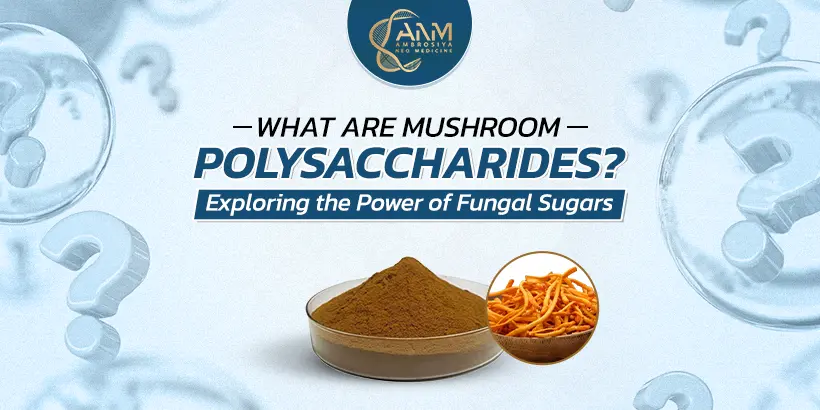What are Mushroom Polysaccharides? Exploring the Power of Fungal Sugars
Introduction
Mushroom polysaccharides have gained significant attention in recent years due to their potential health benefits and therapeutic properties. These complex sugars found abundantly in various mushroom species, play a crucial role in their biological activities. In this comprehensive guide, we delve into the world of mushroom polysaccharides, exploring their types, extraction methods, health benefits, applications, and future perspectives.
Types of Mushroom Polysaccharides
- Beta-glucans
Beta-glucans are one of the most well-known and extensively studied mushroom polysaccharides. These complex carbohydrates possess unique structural properties, consisting of glucose molecules linked in specific arrangements. Beta-glucans are renowned for their immune-modulating effects, activating various immune cells and enhancing the body’s defense mechanisms. Additionally, they have demonstrated significant antitumor activity, making them potential candidates for cancer therapy.
- Chitin and Chitosan
Chitin and chitosan are polysaccharides that provide structural support to the cell walls of mushrooms. Chitin, a long-chain polymer of N-acetylglucosamine, exhibits antimicrobial properties and has applications in medicine and agriculture. Chitosan, derived from chitin, possesses similar antimicrobial properties and has potential applications in wound healing, drug delivery systems, and agricultural practices.
- Mannans
Mannans are another class of mushroom polysaccharides characterized by their mannose sugar units. These polysaccharides have shown prebiotic effects, serving as a food source for beneficial gut bacteria. The fermentation of mannans in the gastrointestinal tract results in the production of short-chain fatty acids, promoting gut health and potentially influencing overall well-being.
Extraction and Analysis of Mushroom Polysaccharides
To harness the benefits of mushroom polysaccharides, efficient extraction methods, and accurate analysis techniques are employed.
- Extraction methods
Various extraction methods are utilized to isolate polysaccharides from mushrooms. Hot water extraction involves boiling mushrooms in water, allowing the polysaccharides to dissolve. Enzymatic extraction utilizes enzymes to break down the cell walls and release the polysaccharides. Ultrasonic-assisted extraction applies ultrasound waves to enhance the extraction process, increasing yield and efficiency.
- Analysis techniques
High-performance liquid chromatography (HPLC) is a widely used technique for analyzing the composition of mushroom polysaccharides. It allows for the separation and quantification of different sugars and their linkages. Fourier-transform infrared spectroscopy (FTIR) provides information about the functional groups present in polysaccharides, aiding in structural characterization. Nuclear magnetic resonance (NMR) spectroscopy provides detailed insights into the chemical structure of polysaccharides, facilitating their identification and analysis.
Health Benefits of Mushroom Polysaccharides
Mushroom polysaccharides exhibit a range of health benefits, making them valuable additions to our well-being.
- Immune system modulation
One of the most notable benefits of mushroom polysaccharides is their ability to modulate the immune system. By activating immune cells such as macrophages, natural killer cells, and T cells, these polysaccharides enhance immune responses and strengthen the body’s defense against pathogens.
- Antioxidant properties
Mushroom polysaccharides possess potent antioxidant activity, effectively scavenging harmful free radicals and protecting cells from oxidative stress. This antioxidant capacity helps reduce the risk of chronic diseases and supports overall health and vitality.
- Anti-inflammatory effects
Inflammation is a natural response of the immune system to injury or infection, but chronic inflammation can contribute to various diseases. Mushroom polysaccharides have been shown to exhibit anti-inflammatory effects, reducing inflammation and potentially alleviating symptoms associated with conditions like arthritis, asthma, and inflammatory bowel disease.
- Anticancer activity
Several mushroom polysaccharides have demonstrated anticancer properties, with the ability to inhibit tumor growth and induce apoptosis (programmed cell death) in cancer cells. These polysaccharides hold promise as potential adjuncts in cancer treatment and prevention. You can read a full blog on Anticancer activity here. And also you can join our Quora community to connect with people with similar interests.
Future Perspectives and Research
The exploration of mushroom polysaccharides is an ongoing journey, with plenty of avenues for future research.
- Exploration of novel mushroom species
There are countless mushroom species yet to be explored for their polysaccharide content. Investigating new sources of polysaccharides may lead to the discovery of unique compounds with novel properties and potential applications.
- Synergistic effects with other compounds
Combining mushroom polysaccharides with other bioactive compounds may result in synergistic effects, enhancing their therapeutic potential. Research into these synergies can unlock new possibilities for therapeutic interventions and product development.
- Clinical Trials and human studies
Further clinical trials and human studies are needed to validate the health benefits of mushroom polysaccharides and establish their efficacy in specific applications. These studies will provide valuable evidence and guidance for healthcare professionals and consumers alike.
Conclusion
Mushroom polysaccharides are remarkable natural compounds with diverse properties and immense potential for promoting health and well-being. From immune modulation to antioxidant effects and anticancer activity, these polysaccharides offer a range of benefits. With ongoing research and exploration, the world of mushroom polysaccharides continues to unfold, paving the way for innovative applications and improved human health. By embracing the power of mushroom polysaccharides, we open ourselves to the vast benefits of these fascinating fungal sugars.

